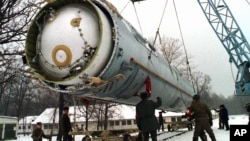CAPITOL HILL —
U.S. senators debating aid to Ukraine say Russia's annexation of Crimea decades after Kyiv surrendered its nuclear arsenal could weaken nuclear non-proliferation efforts around the world. The argument is one of many being voiced on Capitol Hill for a strong U.S. response to Russia’s actions in Ukraine.
In 1994, world powers, including Russia, pledged to uphold Ukraine’s territorial integrity in return for Kyiv giving up what was then the world’s third-largest nuclear weapons stockpile.
Democratic Senator Richard Durbin says Russia has broken its word.
“Russia has not only reneged on that promise, it has invaded Ukraine. [This is] not just a question of the survival of the Ukrainian government, but also a question as to whether or not civilized countries around the world [that are] trying to lessen the threat of nuclear weapons will stand with one voice and condemn the Russians for what they have done," said Durbin.
Durbin said nations aspiring to become nuclear powers or expand an existing arsenal are watching events in Ukraine and drawing dangerous conclusions. That point was echoed by Republican Senator Marco Rubio.
“Think about if you are one of the countries around the world right now that feels threatened by your neighbors," said Rubio. "And the United States and the rest of the world are going to you and saying, ‘Do not develop nuclear weapons, South Korea. Do not develop nuclear weapons, Japan. Do not develop nuclear weapons, Saudi Arabia. We will protect you. We will watch out for you.’ What kind of lesson do you think this instance [in Ukraine] sends to them?”
Rubio said Russia’s annexation of Crimea and possible further expansion into Ukraine will make nations around the world question security commitments made to them, and could lead them to conclude that they, too, must either build or cling to nuclear weapons to remain safe.
Analyst Anthony Cordesman at the Center for Strategic and International Studies doubts Ukraine’s experience will factor into decisions made by other governments.
“I think they draw their conclusions on the basis of local threats, and not on the basis of Ukraine. Israel, Pakistan, India, North Korea are not going to give up [their weapons], and the countries that can acquire nuclear weapons or are trying to, like Iran, are going to make these choices based on other criteria," said Cordesman.
At the Capitol, however, many senators warn of dangers if vulnerable countries conclude that world powers cannot or will not stand up for them. Some describe the Obama administration’s response to Russia’s actions as insufficient, and are urging military aid for Ukraine as well as U.S. natural gas exports to Europe to lessen the region’s dependency on Russian energy.
The Senate bill being debated would provide loan guarantees to Ukraine, codify penalties against Russian officials, and shift America’s contributions to the International Monetary Fund in a way that could facilitate additional loans to Kyiv. Expected to pass this week, the bill would have to be reconciled with separate legislation in the House of Representatives.
In 1994, world powers, including Russia, pledged to uphold Ukraine’s territorial integrity in return for Kyiv giving up what was then the world’s third-largest nuclear weapons stockpile.
Democratic Senator Richard Durbin says Russia has broken its word.
“Russia has not only reneged on that promise, it has invaded Ukraine. [This is] not just a question of the survival of the Ukrainian government, but also a question as to whether or not civilized countries around the world [that are] trying to lessen the threat of nuclear weapons will stand with one voice and condemn the Russians for what they have done," said Durbin.
Durbin said nations aspiring to become nuclear powers or expand an existing arsenal are watching events in Ukraine and drawing dangerous conclusions. That point was echoed by Republican Senator Marco Rubio.
“Think about if you are one of the countries around the world right now that feels threatened by your neighbors," said Rubio. "And the United States and the rest of the world are going to you and saying, ‘Do not develop nuclear weapons, South Korea. Do not develop nuclear weapons, Japan. Do not develop nuclear weapons, Saudi Arabia. We will protect you. We will watch out for you.’ What kind of lesson do you think this instance [in Ukraine] sends to them?”
Rubio said Russia’s annexation of Crimea and possible further expansion into Ukraine will make nations around the world question security commitments made to them, and could lead them to conclude that they, too, must either build or cling to nuclear weapons to remain safe.
Analyst Anthony Cordesman at the Center for Strategic and International Studies doubts Ukraine’s experience will factor into decisions made by other governments.
“I think they draw their conclusions on the basis of local threats, and not on the basis of Ukraine. Israel, Pakistan, India, North Korea are not going to give up [their weapons], and the countries that can acquire nuclear weapons or are trying to, like Iran, are going to make these choices based on other criteria," said Cordesman.
At the Capitol, however, many senators warn of dangers if vulnerable countries conclude that world powers cannot or will not stand up for them. Some describe the Obama administration’s response to Russia’s actions as insufficient, and are urging military aid for Ukraine as well as U.S. natural gas exports to Europe to lessen the region’s dependency on Russian energy.
The Senate bill being debated would provide loan guarantees to Ukraine, codify penalties against Russian officials, and shift America’s contributions to the International Monetary Fund in a way that could facilitate additional loans to Kyiv. Expected to pass this week, the bill would have to be reconciled with separate legislation in the House of Representatives.




